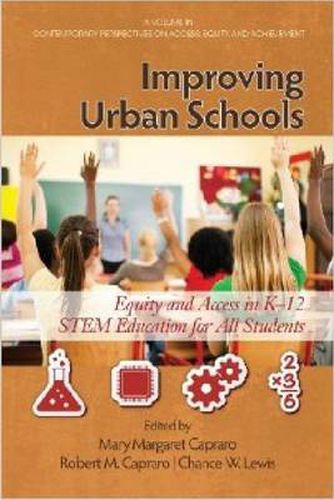Readings Newsletter
Become a Readings Member to make your shopping experience even easier.
Sign in or sign up for free!
You’re not far away from qualifying for FREE standard shipping within Australia
You’ve qualified for FREE standard shipping within Australia
The cart is loading…






This title is printed to order. This book may have been self-published. If so, we cannot guarantee the quality of the content. In the main most books will have gone through the editing process however some may not. We therefore suggest that you be aware of this before ordering this book. If in doubt check either the author or publisher’s details as we are unable to accept any returns unless they are faulty. Please contact us if you have any questions.
Although STEM (Science, Technology, Engineering, and Mathematics) has been diversely defined by various researchers (e.g. Buck Institute, 2003; Capraro & Slough, 2009; Scott, 2009; Wolf, 2008), during the last decade, STEM education has gained an increasing presence on the national agenda through initiatives from the National Science Foundation (NSF) and the Institute for Educational Sciences (IES). The rate of technological innovation and change has been tremendous over the past ten years, and this rapid increase will only continue. STEM literacy is the power to identify, apply, and integrate concepts from science, technology, engineering, and mathematics to understand complex problems and to innovate to solve them (Washington State STEM, 2011, Internet). In order for U.S. students to be on the forefront of this revolution, ALL of our schools need to be part of the STEM vision and guide students in acquiring STEM literacy. Understanding and addressing the challenge of achieving STEM literacy for ALL students begins with an understanding of its element and the connections between them.
In order to remain competitive, the Committee on Prospering in the Global Economy has recommended that the US optimise its knowledge-based resources, particularly in science and technology (National Academies, 2007, p. 4). Optimising knowledge-based resources needs to be the goal but is also a challenge for ALL educators (Scheurich & Huggins, 2009). Regardless, there is little disagreement that contemporary society is increasingly dependent on science, technology, engineering, and mathematics and thus comprehensive understandings are essential for those pursuing STEM careers. It is also generally agreed that PK-12 students do not do well in STEM areas, both in terms of national standards and in terms of international comparisons (Kuenzi, Matthews, & Mangan, 2006; Capraro, Capraro, Yetkiner, Corlu, Ozel, Ye, & Kim, 2011). The question then becomes what might PK-12 schools do to improve teachers’ and students’ STEM knowledge and skills? This book will look at equity and access issues in STEM education from PK-12, university, and administrative and policy lenses.
$9.00 standard shipping within Australia
FREE standard shipping within Australia for orders over $100.00
Express & International shipping calculated at checkout
This title is printed to order. This book may have been self-published. If so, we cannot guarantee the quality of the content. In the main most books will have gone through the editing process however some may not. We therefore suggest that you be aware of this before ordering this book. If in doubt check either the author or publisher’s details as we are unable to accept any returns unless they are faulty. Please contact us if you have any questions.
Although STEM (Science, Technology, Engineering, and Mathematics) has been diversely defined by various researchers (e.g. Buck Institute, 2003; Capraro & Slough, 2009; Scott, 2009; Wolf, 2008), during the last decade, STEM education has gained an increasing presence on the national agenda through initiatives from the National Science Foundation (NSF) and the Institute for Educational Sciences (IES). The rate of technological innovation and change has been tremendous over the past ten years, and this rapid increase will only continue. STEM literacy is the power to identify, apply, and integrate concepts from science, technology, engineering, and mathematics to understand complex problems and to innovate to solve them (Washington State STEM, 2011, Internet). In order for U.S. students to be on the forefront of this revolution, ALL of our schools need to be part of the STEM vision and guide students in acquiring STEM literacy. Understanding and addressing the challenge of achieving STEM literacy for ALL students begins with an understanding of its element and the connections between them.
In order to remain competitive, the Committee on Prospering in the Global Economy has recommended that the US optimise its knowledge-based resources, particularly in science and technology (National Academies, 2007, p. 4). Optimising knowledge-based resources needs to be the goal but is also a challenge for ALL educators (Scheurich & Huggins, 2009). Regardless, there is little disagreement that contemporary society is increasingly dependent on science, technology, engineering, and mathematics and thus comprehensive understandings are essential for those pursuing STEM careers. It is also generally agreed that PK-12 students do not do well in STEM areas, both in terms of national standards and in terms of international comparisons (Kuenzi, Matthews, & Mangan, 2006; Capraro, Capraro, Yetkiner, Corlu, Ozel, Ye, & Kim, 2011). The question then becomes what might PK-12 schools do to improve teachers’ and students’ STEM knowledge and skills? This book will look at equity and access issues in STEM education from PK-12, university, and administrative and policy lenses.